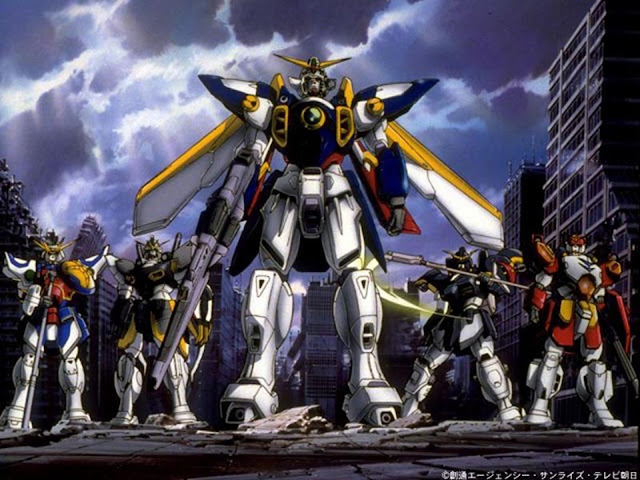Synopsis:
In the distant future, the powerful and oppressive Earth Sphere Alliance uses the might of its military arm, the Organization of the Zodiac ("OZ"), to wield absolute authority over the solar system's outer space colonies. After the colonies fail to achieve independence via peaceful means, five disgruntled OZ scientists sympathetic to the colonies' plight secretly enact a covert rebellion - they develop five cutting-edge mobile suits and train five young men as pilots, sending the Gundams to earth in "Operation Meteor" to fight back against OZ's legions. As the conflict plays out, alliances are drawn and redrawn, and the opposing philosophies of peace through mutual pacifism or utter dominance are put to the ultimate test.
Release Date:
1995-1996
Episodes:
49
Timeline:
AC 195
My Grade:
C
Having completed our exhaustive viewing of the Universal Century timeline of Gundam media, Leah and I decided we were ready to move on to the standalone franchise installments. We had both watched Mobile Suit Gundam Wing when it originally aired in 2000 on Cartoon Network's Toonami animation block, and were excited to go back and relive the first Gundam series that most Americans, including ourselves, became familiar with. Unfortunately, most of what we remember enjoying can be chalked up to nostalgia, as Wing doesn't hold up so well with fresh eyes, and is, at its best, merely mediocre.
Mobile Suit Gundam Wing is the sixth full-length series in the Gundam franchise, and the second to depart from the core Universal Century timeline. After the completely wacky premise of its immediate predecessor, Mobile Fighter G Gundam, Wing draws its influence from the many disparate aspects of the broader Gundam franchise, ultimately combining familiar subject matter (e.g. a military conflict between earth and its space colonies) with a brooding, ultra-melodramatic, and unmistakably '90s tone. The result was a very successful (though now dated) entry which helped reinvigorate the Gundam franchise, broadening its appeal both domestically (including with young women) and abroad.
The very '90s feel can immediately be seen in Wing's five main characters, the G-Team. While there's some variety in the group represented by Duo ("funny anime guy who sees himself as cool anime guy") and Quatre ("kind optimist anime guy"), the other three - Heero, Trowa, and Wu Fei - are all "stoic anime guy". They're so stoic, in fact, that their personalities seem to border on psychopathy, especially our heroic (?) male protagonist Heero, who is infamous for threatening to murder Relena (the main female protagonist) upon their first meeting and throughout the first half of the series. These guys are tropes personified, making dramatic declarations with crossed arms and closed eyes, showing no emotion, and thinking nothing of killing their enemies (keep in mind they're each supposed to be about 15 years old).
Other characters like Relena Peacecraft (the "special girl" Gundam character), Treize Khushrenada (ultra-suave leader of OZ), and Zechs Marquise (OZ's top pilot and notable "Char clone") don't fare much better. Poor Relena is stuck for the whole series strangely obsessing over her would-be murderer Heero, as well as evangelizing a naïve worldview of "total pacifism." Treize spends virtually every episode manipulating the events of the war via overly convoluted plots (all the while pontificating nonsensical philosophy), only to let himself be killed for absolutely no reason at the end in one of the biggest head-scratching moments of the whole series. Zechs is a feather blowing in the wind, playing whatever role the plot needs him to at that moment, notably transforming toward the end from a relatively honorable and moral soldier into a genocidal maniac for reasons that are barely explained.
The overall plot is a messy ride, with convoluted twists that don't always make sense, even with the narrator who, in a seemingly desperate display of poor writing, occasionally just explains to the audience what events are occurring via voiceover, even though we don't get to see them. The Gundams themselves have plot armor most of the time, shrugging off all attacks and in turn destroying every opponent with one hit, only to crumple instantly when the writers demand it. However, I think the biggest problem with the story is that we rarely, if ever, see civilians in the world of Wing. Almost all the events play out on battlefields, in political chambers, on military vessels, or in aristocratic castles. The world itself feels utterly uninhabited - we don't really see ordinary citizens of earth or the colonies, and thus never get a sense of what the stakes of the war are. Toward the end, when Treize dramatically reveals that he knows the name of every dead soldier, both under his command and the enemy's, I could only think, "What about all the civilians that probably died in this war?"







.png)

Comments
Post a Comment